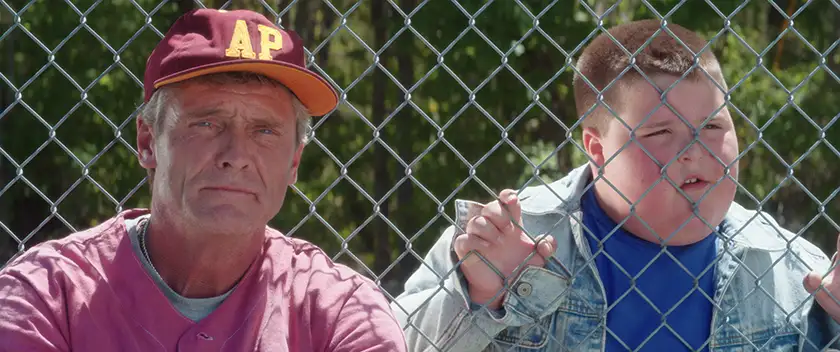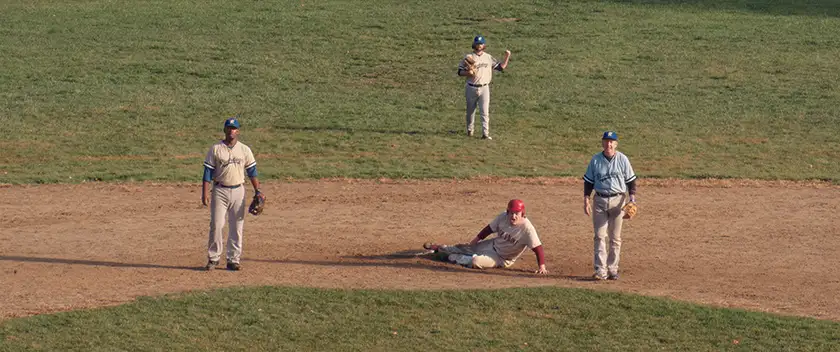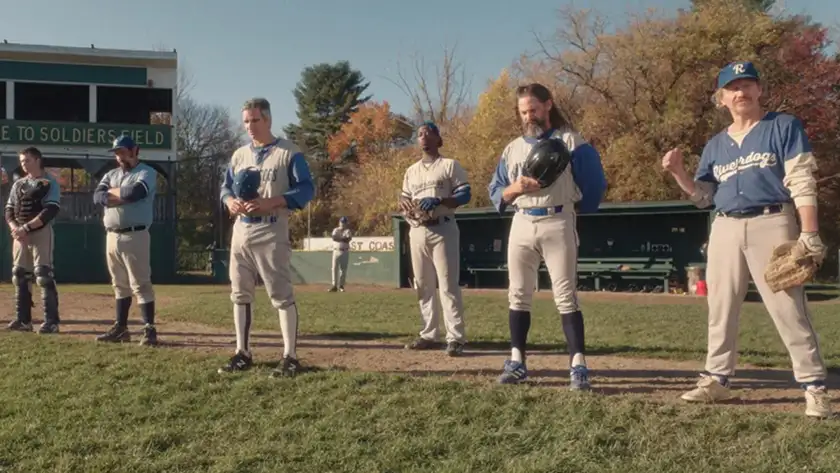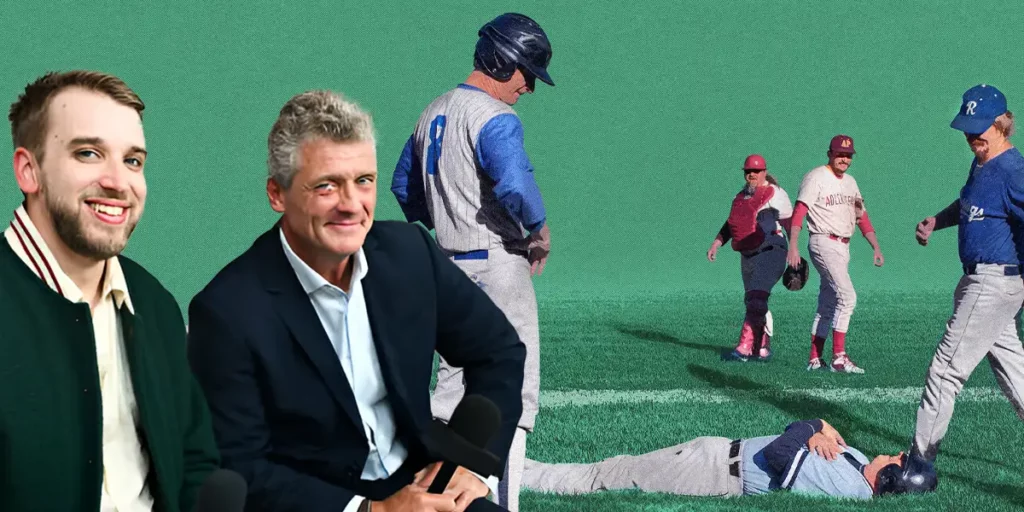We interview writer-director Carson Lund and actor Keith William Richards on the Croisette to discuss their film Eephus, shortly after its premiere at the Cannes Film Festival.
The Director’s Fortnight (Quinzaine des Cinéastes) at the Cannes Film Festival is a welcome sidebar from the hustle and bustle of the main competition. It’s non-competitive, and focuses on showcasing new talents from all over the world, particularly those with bold new visions and filmmaking methods on display. In the 2024 selection, writer-director Carson Lund’s Eephus finds itself in such compelling company, as punk Indian commentary Sister Midnight and the absurdist comedy Universal Language arrived to acclaim and strong buzz.
Eephus isn’t as brash as some of the other films in the selection, but it absolutely exemplifies the unique vision sought by the organisers. Over the course of a day, we see a group of amateur baseball players get together to play ball, talk trash and have fun before their beloved playing field is closed for good.
Writer-director Carson Lund, and his filmmaking collective Omnes Films, focus on creating stories driven by character and atmosphere rather than narrative. Their films seek to examine the decay of American cultural artifacts. Ironically, they do this through filmmaking and writing styles laid down by great filmmakers before them. Eephus can feel like a particularly fun spin on the likes of Richard Linklater and Robert Altman, as its ensemble cast of laid-back guys give their hallowed sports ground a worthy send-off.
At what has been a very good Director’s Fortnight for Omnes Films, with two films in the selection, we meet Lund and one of his stars, Keith William Richards, for an interview on the Quinzaine Beach.
Carson Lund and Keith William Richards on the script for Eephus
Where did the idea for Eephus come from? Was it based on your own experiences?
Carson Lund: I would never have written the script if I didn’t play baseball. It’s entirely rooted in my experience, all the different memories I’ve had over the years and the types of people who you meet, and the types of conversations that people have. I wouldn’t say I kept very diligent notes while I was playing games; I just pulled from memory. I had my screenwriters come to the field a few times and take their own notes, so they’d have their own impressions, but really, everything in the script is, for me, some sort of half-remembered detail that I found amusing. On a bigger level, I wanted to capture what it feels like to play the game. I think baseball specifically, and sports in general, allow you to experience time in a very specific way, because you’re savouring the present moment passing. A lot of games have a clock, but baseball doesn’t have one, so it allows you to have this really serene feeling as you play it.
The competition is there, the egos are there clashing, but there’s always respite in the dugout. You all sit down, you get a moment to collect yourself and just joke around, and then, suddenly, your attention is back on the field. There’s this funny sort of dynamic that happens. You’re a little bit distracted, and then, boom!, you’re back in the game. I don’t know if that feeling of playing has ever been captured before in a film. Not to toot our own horn, but I don’t think it’s usually the priority of filmmakers to create that very specific feeling. Historically, baseball films have been about a character using the game to advance them psychologically, in some way. I wanted to give the viewer that feeling of what it’s like to be on that field, and witnessing all of this happen with these guys.
The dialogue has a very naturalistic and easy-going feel. How much of the script was improvised?
C.L.: The script was very carefully written. We were very precise about dialogue. I wrote it with two of my best and funniest friends, Nate Fisher and Michael Basta: I knew I wanted to write it as a small group. Because it’s such an ensemble film, I wanted to bring all these different ideas in, and we had been discussing it for a while. We had a very vivid idea of the kind of characters we wanted to piece together for this film. I think we all share a certain taste in dialogue as well, kind of short and sweet and to the point. We had certain carefully calibrated punch lines.
We did stick to the script, but we allowed for flexibility. There are some little tweaks here and there for what felt comfortable for the actors. I would say that, over the course of the shoot, we strayed a little further and further from the script, as we just found this amazing chemistry between all these actors who were living together, and coming to work together, and sharing so much time together that it felt like we should embrace that and let these guys riff of it. We didn’t use all of that material, but I think there was some real magic that we never could have written.
Keith William Richards: Exactly what he said! The narrative was definitely kept in play. Carson created these little punchlines that help you learn more about the characters when you know that they go back and forth, whether it’s arguing over a ball or talking about something at home, or sharing information about the game. Everybody had something to say to somebody, but it also exposes who they are. You get a better feel of the connection between the two. As far as the script goes, I think Carson already knew it was going to take on its own form. The surprising part was that it fell into place so nicely, and there was so much of it. He had a lot to sift through. He edited this too, which was a lot of work. He did a great job.
The way Carson described it to me in the beginning, it was basically just a baseball game. I knew there was something more he wasn’t telling me. I’m 61, and I saw the other team, and some of these guys couldn’t even tie their shoes, so I knew there was more to it! But then he went on to explain more and more, and he pretty much stuck to it. There was so much to choose from. We had such a great group of guys, you know, and everybody was perfect. Everyone got along. Like Carson said, you can’t keep it all, and that was the struggle. He stuck to selling this idea that it’s not just baseball. It really plays in everybody’s life, including their families. They’re the only ones that watch the game anyway! They were playing ball just to play ball. They weren’t doing it to entertain anyone but themselves.
Carson Lund on his various roles on Eephus
As well as directing and co-writing Eephus, you’re its co-producer, editor, and you worked on the soundtrack. How did you balance those roles day-to-day?
Carson Lund: As far as balancing the roles goes, I’ve always seen myself as a filmmaker. I’ve always performed different roles on films. When you work from a place of limited resources for so long, and with just a small group of friends, you all share different responsibilities on a movie set. Even when we’re just kids screwing around with cameras, we would shoot, make the music and edit it. I’ve just always seen this fluid relationship between all the different parts of filmmaking and I think, as the budgets grow, and the projects get even more ambitious, I understand why there’s the hierarchy and there’s the distribution of labour, of course. But especially for my first feature, I felt so connected to this way of working, where I have my hands in every aspect, that I wanted to try to make sure I held on to that.
Did you always intend to compose and record a score for the film?
Carson Lund: I am a musician, and I’ve played in bands for a long time, so music is very close to me. I didn’t actually plan to have music in the film, but in the edit I realised I wanted to do something that would add a nice counterpoint to the action, and cue the viewer into the impending demise of this baseball field, and the emotions that are gradually coming to the surface. I decided to do a score with my brother. Because of the long timeline of this film, and the fact that it’s an independent film, these aspects were not all overlapping, so I could take the time I needed to perfect everything. I would have felt a little detached from the process if someone else were holding the keys, at least for this project. Maybe I’ll delegate a bit more than that in the future, but right now it’s been great.
Carson Lund and Keith William Richards on Eephus’ universal message
With its focus on baseball, do you think Eephus will resonate with audiences outside the U.S.?
Carson Lund: I do believe in the idea that in art, it’s through this specific that you find the universal. It’s clichéd, but it’s true, that the further you dive into something and give people that that tangible sense of a very shared language, and that maybe that audience doesn’t quite understand, that you feel their passion. I think the passion and the camaraderie really come across in this film, and their shared desire to savour the moment and reconnect with some inner child, that I think transcends baseball. It could be any sport. It could also be any activity that you pursue with a group of people outside of your job, or your vacations, or with your family. There’s always a different sense of obligation or expectation of how to spend your time.
In this scenario, you’re getting together with people over a shared passion. I think that’s something that we all need to seek in our lives to reconnect us with the passing moment, and not get bogged down in all these things that we have to do every day to keep ourselves busy and employed. The same film could be made about a crocheting group – a group of old women crocheting! There’s a similar theme at play. Yes, it’s rooted in baseball, but that’s my experience. I think the experience of these men is something that everyone seeks in their lives.

Keith William Richards: For a bunch of grown men, it’s an outlet. It’s not like they get tired or start hoping something is pulled out from under them. They had no intention of ever stopping. Some of these guys wanted to die on the field; it would have been perfect for them. They’re a club of baseball fans, but they love the sport. They get to be a legend in their own mind when they’re on the field. They imagine their best play, and go out there and just do what they do, and not have to worry.
C.L.: When I come to Paris, I’m so amazed at how many people spend time in parks on a Sunday: they just get together, get a bottle of wine, and enjoy the day. That’s not something that we do in America as much: I feel as though there’s less and less public space to do that, because of gentrification, and because people are so damn busy due to our economy and the way it’s structured. A lot of people have to work two jobs. There’s no time to sit around and enjoy each other’s company. I really admire that about Paris or Rome, or many different cities in Europe, where I feel there’s a different attitude towards living. I think that’s a temperament that’s disappearing a bit in America, and I wanted to reconnect us to that with this film.
Carson Lund on Eephus’ supporting characters
Arguaby the most famous name attached to Eephus is documentarian Frederick Wiseman, who cameos as a radio announcer. How did he get involved?
Carson Lund: He’s a legend, one of my favourite living filmmakers for sure. I actually just had lunch with him in Paris! It was the first time we had spoken in person, actually.
I spent a lot of years in Boston, Massachusetts for college. He’s from Massachusetts; he has a place in Cambridge, so I’ve been in the same circles as him. I got his contact information, and sent a cold email to him and his assistant. I originally asked him to be in the film, playing the character of Franny, the local scorekeeper. The funny part about that is that Franny is written in the script as a character in his 60s. Fred said to me, “You do know I’m 94, right?” We said we’d make an exception in this case, but it didn’t end up working schedule-wise.
When I was in post-production, I remembered that he had such a really fond memory of reading the script. He loved it, and had said some very nice things about it. So, I reached back out to him. At that stage in post-production, I knew I wanted to bring in the radio as another kind of piece of soundtrack to create this kind of Greek chorus of different voices from the town, and sort of like a running soundtrack to the game. This is very common for people to bring some sort of noisemaking machine to one of these sorts of leagues to just entertain themselves. I thought Fred would be a great voice to introduce us to this world. He’s got that wonderful, rich folksy voice from New England. He was just perfect for it.
I also felt that the kinds of films he makes, these portraits of big communities and ecosystems, very specific subcultures are something similar to what I’m trying to do with this film. Of course, he’s doing it from a nonfiction perspective, but this is a fictionalised account of a very large milieu that has its own strange rules, and its own language even. I wanted to cue the viewer into the idea that this is not going to be a typical sports movie, or driven by one protagonist, and I think he’s a perfect kind of introduction to that idea.

Can you tell us more about the character of Franny, the hobbying scorekeeper played by Cliff Blake? You dedicated the film to his real-life counterpart.
C.L.: The character of Franny is an homage to a townie from where I’m from in New Hampshire. Everyone knew his name, he walked around town, he said ‘hello’ to all the people. He’d also be at every single baseball game in town. There was a semi-professional league in my town, so he would be at all the different games. In the summer, he’d always be there behind home plate, cheering everyone on. I took a little bit of a different route with the character. I made him more introspective, but he was always a guy who was who’s really tied to his record his record-keeping and his score books. I look at this, and it’s really touching to me, as I was someone who grew up loving, paying attention to stats. There’s something about keeping track of these kind of trivial details that I find really amazing about this character, who’s probably got a whole backlog of these things stuffed in his basement.
As we were finishing the edit, I decided I was gonna check in on the real Franny and see what’s up, because I realised through the edit that the he’s really the soul of the film. He’s the type of person that this movie is about, really. He embodies it in so many ways, the passion, the obsession, and the loneliness too. Franny was ravaged by COVID, sadly, and was in the hospital for a long time, and unfortunately passed away. It was right around the time we were finishing post-production, so I felt it was very necessary to give him this tribute.
Carson Lund on his film influences for Eephus
Some people have compared Eephus to the work of Richard Linklater, with its laid-back atmosphere and ensemble cast. Are there any particular filmmakers that influenced you?
Carson Lund: I love Aki Kaurismäki’s work: he’s a big influence. I need to see more of it, and it doesn’t always make it to the States on a big screen, though it’s certainly more available now than it was ten years ago. I’ve seen a good portion of it. His sense of humour and his pacing are such an influence to me. I feel like a kindred spirit with Kaurismäki’s style of filmmaking. I found him just by being a cinephile. It probably stemmed from Jim Jarmusch. I fell in love with Stranger Than Paradise when I was young, and everyone compares Jarmusch to Kaurismäki. Just the way his films are described, a raw sense of humour, dark dimly lit bars, working class people struggling to get by, and the beauty and poetry in all that.
Kaurismäki is Finnish, but your own name is Scandinavian too. Do any other filmmakers from that part of the world appeal to you?
C.L.: My first name is a very Swedish name. I’ve never done an ancestry test, but I believe there’s Swedish heritage on my Dad’s side of the family. He really embraces his Swedish heritage. He listens to Swedish language tapes in his car on the way to work and tries to learn it. It’s very touching.
I’ve always loved Ingmar Bergman films, and his work was one of my earliest passions as a cinephile that I felt was connecting me to my ancestry in some way. I felt connected to his work for whatever reason. I love the cold weather, the bleak atmosphere he creates in his films. Yeah, there’s definitely Swedish heritage in there. Maybe even some Finnish heritage? But I’ve never been there. I would love to, maybe with a festival.
For a reference point, people might compare Eephus to other baseball movies like Moneyball. Would you agree with such comparisons?
C.L.: I think it’s nothing like Eephus. Of course, it’s a great film about the business of baseball. I think Brad Pitt’s great in it. I watch the major leagues in professional baseball, so I had followed all that stuff behind the scenes, too. It’s interesting to watch that, but it’s not really an inspiration. It’s definitely so much about the workplace, you know, and this fulfils about the opposite of the workplace.
Carson Lund on influences outside film for Eephus
Did you take any inspirations from outside the world of film?
Carson Lund: Less so, to be honest, but I will cite a really great journalist named Roger Angell, who was a writer for the ‘New Yorker’. He was really brilliant in his writing about baseball, but also just about everyday life in New York, just mundane bits of information from his wanderings about town. He wrote really eloquently about baseball because he would write about much more than the game and the players. He would write about the experience, which is what this film is so devoted to.
Some of his books have been put out, like compilations of his different writings. There’s one that’s really great called ‘The Summer Game’. It’s about baseball, but again, it’s not really about baseball. It’s why I love it so much. The passion really comes through, and he writes so beautifully about how the game is a refuge from life’s troubles, and it’s this beautiful space to just convene and have a good time. To have a rooting interest is something that maybe feels childish, but it connects us to something that’s so important.

I’m always inspired by many different painters. Edward Hopper, of course. The loneliness of his compositions, all the negative space is important, and that’s very true in baseball. You have all this space around you, because you’re all alone out there in the field, but you’re all together at the same time.
One notable musical influence has to be Tom Waits. How did you decide to use ‘Ol ‘55’ for the closing credits?
C.L.: I’ve loved his music for a long time. I don’t think he was always in my mind, but during shooting, I wasn’t listening to a lot of music, but I was trying to get in the headspace of Eephus, and I heard that song. The first line is, “Well, my time went so quickly, I went lickety-splitly out to my Ol ‘55.” That’s what all these guys are doing, so it’s actually kind of literal. The lyrics read exactly as the movie ends. Just the mood of that, I thought, captured the film, the melancholy of it. I made that decision; it had to be that song, and we weren’t going to take no for an answer.
Like the song, the movie leaves the viewer with a lot to ponder, I hope. There’s no bow on the end. They just leave, and of course you know how it’s going to end. The game is gonna end, and they’re gonna go home. I think every viewer might feel something a little different about that.
This interview was edited for length and clarity.
Eephus premiered at the Cannes Film Festival‘s Quinzaine des Cinéastes on May 19, 2024. The film was released in theaters in New York on March 7, 2025 and will be out in more cities from March 14. Read our review of Eephus!
Header credits: Carson Lund and Keith Williams Richards at the Deadline Studio during the 77th Cannes Film Festival presented by NEOM on May 19, 2024 in Cannes, France. / Poster for the film Eephus (Michael Buckner via Getty Images / Omnes Films)

